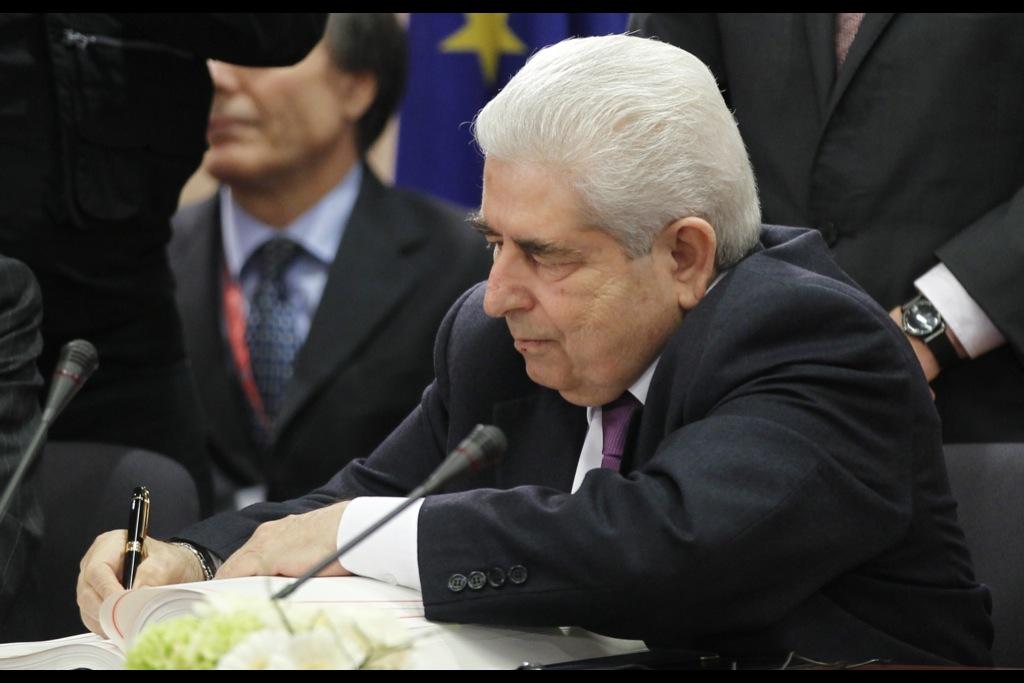Another bailout in Europe, this time for Cyprus
Cyprus President Demetris Christofias at the two-day EU summit on March 2 at the EU headquarters in Brussels. Today is the start of another two-day EU summit.
Finland doesn’t get the white-hot attention Germany does, but it should because it could be the driving force behind a breakup of the Eurozone. And it fired another shot: it demanded collateral for its share of the billions of euros that Cyprus would receive from the bailout Troika.
Cyprus is the fifth of 17 Eurozone countries to ask for a bailout. It’s panic time. The first tranche, €1.8 billion, is needed by June 30 to prop up its second largest bank, Popular Bank. And suddenly, Bank of Cyprus, the largest bank, needs €500 million. That’s just the beginning.
All its big banks have been eviscerated by Greek government bonds, Greek corporate debt, a real estate bubble that collapsed, and a title-deed scandal that they colluded in—whose outcrop is now gumming up their balance sheets [I warned about it in October…. Another Eurozone Country Bites the Dust].
Though the government denied any amounts had been discussed, Reuters' “Eurozone sources” attached a number to it: €10 billion—for a country that acceded to the Eurozone in 2008, has a GDP of only €17.3 billion, and has the population of San Francisco (just above 800,000). It takes a lot of talent to accomplish so much with so little.
In return, the bailout Troika will prescribe its bitter medicine: bank recapitalizations, structural reforms, privatizations, reductions in civil servants, and budget cuts. Communist President Demetris Christofias, who speaks fluent Russian, attended university in Moscow, and is an ally of Russian President Vladimir Putin, had already endeared himself to the bailout Troika—the European Commission, the ECB, and the IMF—by accusing them of being run like a “colonial force.”
Being so closely tied to Greece and having seen what happened there, Cypriots are worried about the fate that might befall them. But Finance Minister Vassos Shiarly had soothing words. It would be premature to speculate, he said on state radio, but the terms of the bailout “won’t be so painful as some may believe.”
Cyprus has been playing a guessing game. It would prefer a bilateral loan from either Russia or China. A veritable shuttle diplomacy has been taking place, with Cypriot officials flying to one or the other country and returning with promising smiles but little else. Last year, after it had been cut off from the capital markets, Cyprus received a €2.5 billion loan from Russia; and earlier this month, rumors were swirling around that it would receive another €5 billion. But so far, nothing. And the Chinese, who know how to negotiate, even with their communist friends, have shifted their attention to Malta on another project.
Russia and China have reason for wanting a stake in Cyprus: vast off-shore deposits of natural gas. The field off the southern coast might hold as much as 8 trillion cubic feet of gas. It’s likely that there are other fields around Cyprus. 15 major oil and gas companies and consortiums, including some from Russia and China, are bidding to do exploratory drilling, and they’re eager to build LNG export terminals and other massive infrastructure projects [read…. Manna for Bankrupt Cyprus].
But Russia and China could demand a heavy price in return for a loan—and that’s why Cyprus is even talking to the despised Troika. President Christofias, whose communist heart is closer to Russia and China, has perhaps already seen that price. So he’s fishing for a better deal. But by June 30, Cyprus must get the first €1.8 billion.
Ironically, the next day, Cyprus will rotate into the Presidency of the Council of the EU for a six-month term, as spelled out in the Lisbon Treaty. That’s democracy at the EU level: mechanized, predetermined by treaty, beyond vote. And the only directly elected institution of the EU, the European Parliament, shares the legislative functions with the Council (that Cyprus will preside) and the European Commission; but the Parliament emasculated because it cannot even propose bills.
This lack of democracy is the dark backdrop to the tohubohu about a fiscal union, a banking union, Eurobonds, the idea of integrating the Eurozone more deeply, and all the other panaceas central to the EU summit: they hinge on transferring important aspects of sovereignty from democratic nations to unaccountable bureaucrats, appointed technocrats, or predetermined officials, all with an ever-increasing thirst for power. And the frustration is already high….
“An EU paradox! Now we have a situation where the dog will be in charge of the sausage supply,” said Kurt Lauk, President of the economic advisory board of the CDU, the party of German Chancellor Angela Merkel. “How can Cyprus engage in crisis management when it’s stuck deep in a crisis itself?” he asked. An eloquent paradigm for all Eurozone bailouts. He then demanded that all bailed-out countries be excluded from the presidency. An issue left up to voters, directly or indirectly, in democracies.
During the two-day EU summit, all eyes will be breathlessly riveted on Chancellor Merkel—with one question on all lips: will she blink? Because nothing less than the future of the Eurozone and the euro is at stake. And by extension, the world economy. Only she can save it. And she’d have only 48 hours!
More from our partners at Business Insider:
Business Insider: STOCKS TANK, DOW OFF 150
Business Insider: PRESENTING: The Worst Economies In The World
Business Insider: Now That Obamacare Has Passed, Here's What It's Going To Cost You
Business Insider: Citi Slashed The Big Investment Banks
